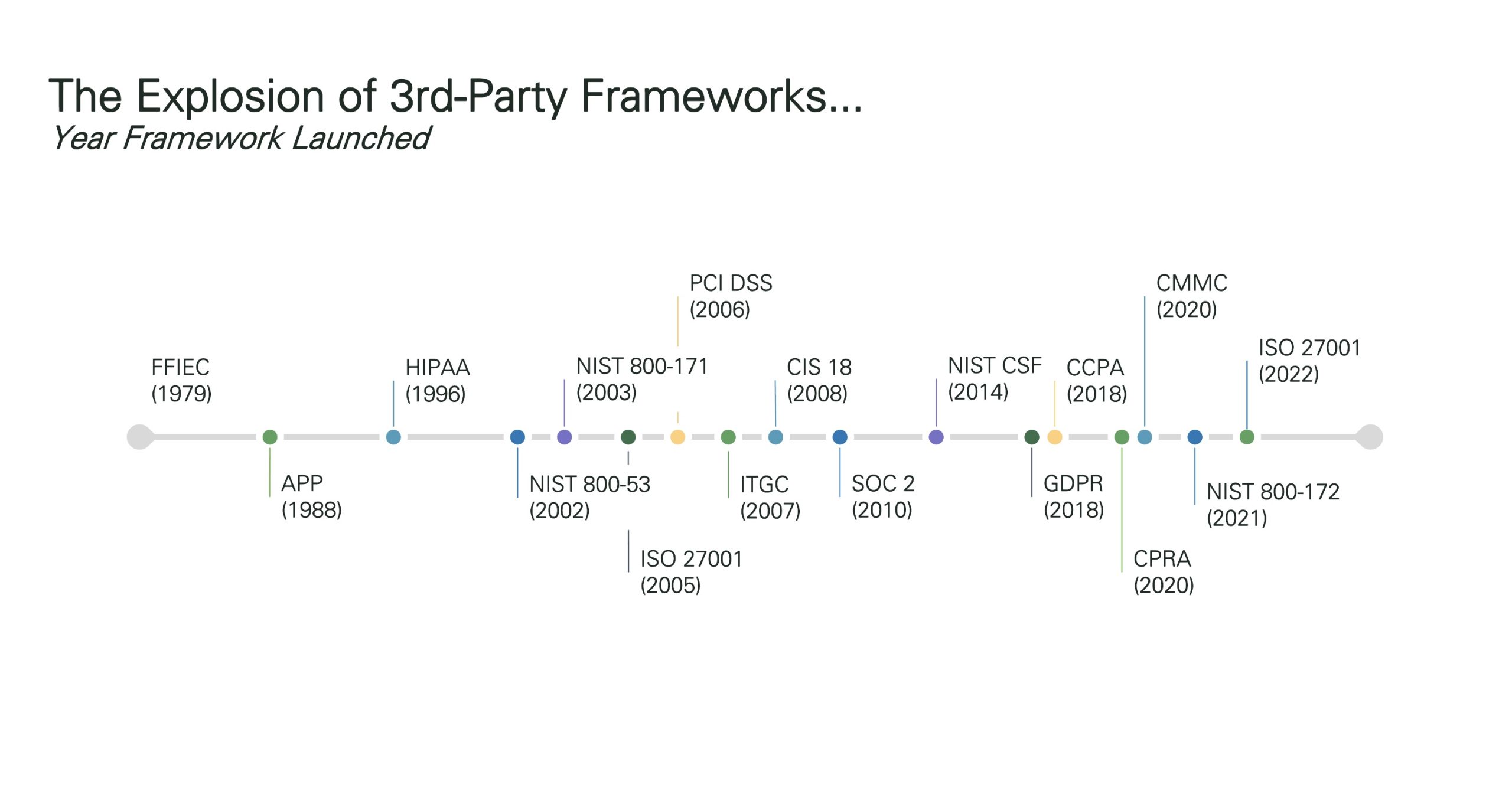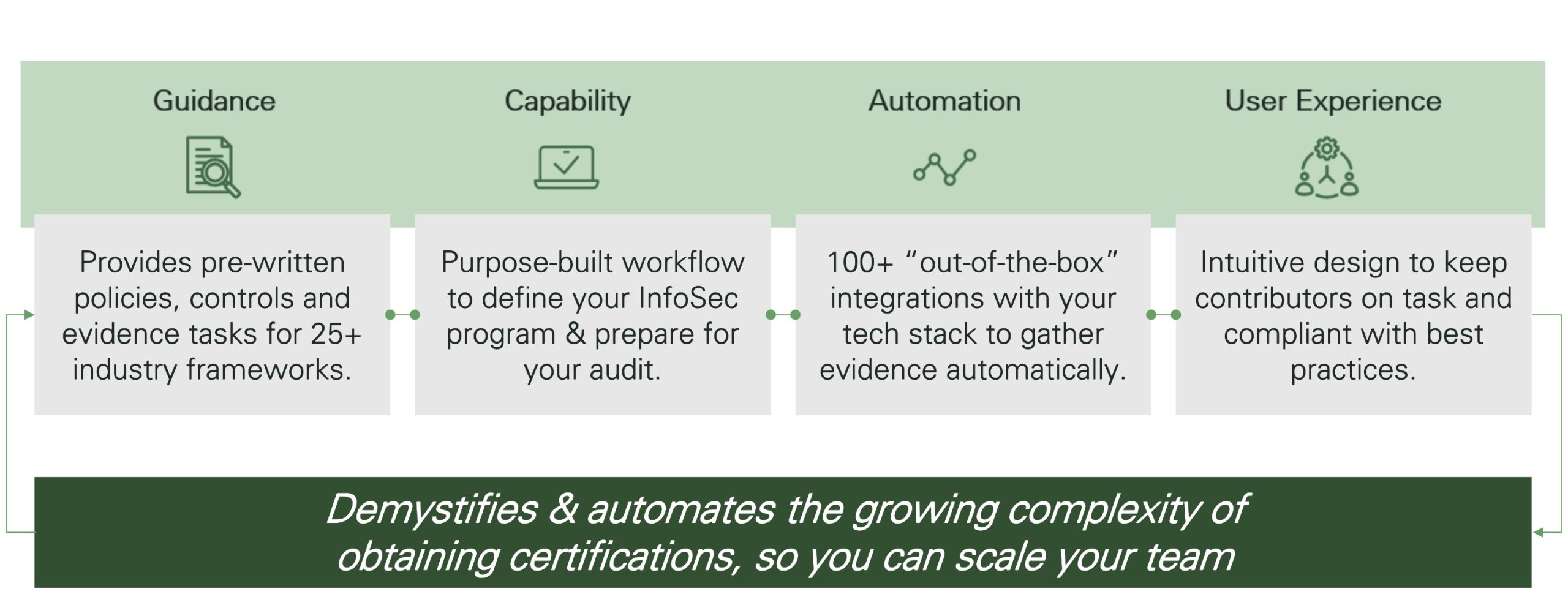In the old days, it would be 10 years before you had an update or never at all. But now, you’re in this era of multiple frameworks, stakeholders, SaaS apps, and scopes and you have to keep up with the changes. It’s become challenging for people to manage this on their own without automation and technology.
Q. How have these market changes impacted internal programs?
PM: The number one thing I’m hearing from customers is these changes are creating compliance fatigue. People are doing duplicative work and if you talk to most customers, evidence collection is the most painful part of an audit. They don’t know what evidence to collect. It’s not easy to understand and the amount can be daunting.
Low engagement is another big problem. How do you get everybody else in your organization to help you? It’s not just on the InfoSec team to get everything done – they’re relying on the entire company to become compliant and build a risk-based culture.
The current state is this: Legacy GRC products don’t have the guidance, don’t have the automation to plug into your tech stack, and don’t have good user experience. Who’s explaining this to the first line of defense or encouraging evidence collection? The CISO or Head of Compliance. And as everyone knows, they already have a lot of stuff on their plate. We need to release and scale that team – that’s where we’re at now in terms of the problem statement.
Q. How does Compliance Automation deliver content and guidance?
Jose Costa: Unlike legacy GRC solutions, the moment you log onto our Compliance Automation platform you get a guided experience throughout the process.
It starts with answering questions about your environment and tech stack, and we’re able to narrow down controls, policies, and guidance so you can start working from day one. The tasks are pre-populated and come with templates out of the box. We take the guessing out of this process.
You don’t struggle once the auditor shows up. You’re building your compliance program in a way that everything is in one place. You can also bring your own content, as you modify this system of records and make it your own.
The team responsible for the content and guidance in the platform, we’re all security consultants and IT auditors. We’ve been doing this for years. We know the answers to the test, we know what you need to collect.
As a former auditor, it’s nice to show up and have the evidence you need to do your work without having to ask for additional things. It’s a huge time-saving tool. Happy auditor, happy customer.
Q. How does content and guidance help with the expanding landscape of frameworks?
JC: A lot of these frameworks overlap. You have to comply with multiple frameworks – most people do. There are mappings on the internet with control to control. But when you get down to collecting evidence and showing auditors what you do, it’s hard because there are nuances, little things that are different between each control.
We map all controls at the evidence task level. This allows you to collect things once and reuse them across other frameworks. Your risk register will automatically map to any controls you have, your policy is updated with the latest requirements, and you’ll have the latest controls in your library ready for your auditors. Collect things once and avoid audit fatigue.
Q. You’re doing all these different frameworks across different apps, different technology, run by different departments in a company. How do you drive consistency?
PM: The first piece to help get ahead of all this complexity is to use automation to integrate directly into your tech stack. Even if you say you have AWS, for example, there are a number of different use cases. We’ve prebuilt 100+ use cases where we not only integrate to pull requisite information but provide a type of guidance.
Jose and his team build curated evidence files so you don’t just vacuum up a bunch of information from your cloud environment. Some of it’s not necessary and you don’t want to do that from a security perspective. We put it in the right evidence task so you don’t have to figure it out yourself. It’s quite time-consuming and all these different tech products work differently. We allow you to automatically collect evidence but also verify that it’s compliant.
One of the things we’ve done is create an intuitive user experience that guardrails non-infosec- or non-compliance-savvy people to stay on task. We write all this content, what to collect, how often to collect it. OneTrust saves you a ton of time and keeps you consistent, which is the whole point of compliance.
You’re not getting to continuous compliance without automation. It’s not going to happen. It’s too difficult. Automation gets you beyond the certification. You’re not just compliant when the auditor comes once a year, you’re compliant all the time.
Q: How does Compliance Automation pull everything together?
PM: Our thesis on what modern GRC products need to keep up with complex requirements is, first and foremost, you need some guidance. Keeping up with all these frameworks is an insurmountable task for even an experienced CISO. You need a partner to help you keep track of new frameworks and know what to do so you can be responsive to your customers.
Second is capability. Do you have the flexibility to build a workflow to manage all this complexity? How do you interact with your second line of defense, the general departments of your company? If you can’t automate it, you have to interact with the business.
Third is automation. You want to automate as much as possible. With OneTrust, we can’t automate everything, but we can automate a good 50% of it. We reduce your work but more importantly, we ensure you’re continuously compliant for every interval you may be tested on during your certification.























